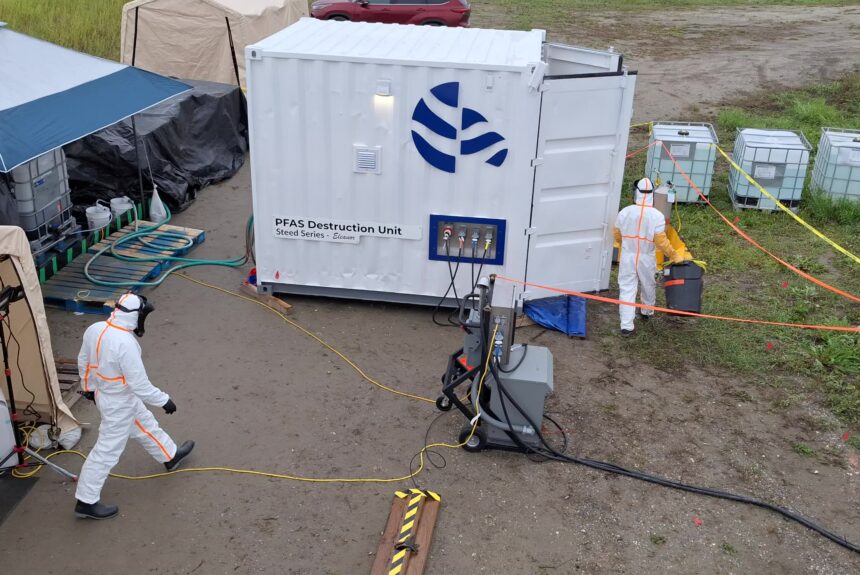PFAS are a group of over 4,700 man-made chemicals. Since the 1940s, Per- and Polyfluoroalkyl substances (PFAS) have been used in a variety of products including cell phones, solar panels, nonstick cookware, medical appliances, and cosmetics. Some PFAS are notoriously difficult to eradicate under normal conditions and can remain in the human body for years. These ubiquitous synthetic compounds have been linked to a number of health concerns in humans from increased cancer risk to kidney disease to an impaired immune response. It is worth noting that not all PFAS have the same properties and pose the same risk. Nevertheless as increased awareness of the potential impacts of PFAS chemicals is increasing, lawmakers and consumers are facing the stark reality that these substances are extremely difficult to replace as they are instrumental to so many products businesses and consumers use. While the EPA has proposed new PFAS regulations, a number of innovative startups are rising to the task of providing safe, cost-effective alternatives. One such company is Tacoma, WA-based Aquagga, a clean-tech firm specializing in wet-waste treatment technology to eliminate long-lived PFAS.
>>>READ: Carbon Mineralization is Helping to Turn the Tide on Climate Change
Aquagga’s claim to fame is its powerful PFAS destruction units. This summer, a pilot unit dubbed ‘Eleanor’ was successfully deployed to an airport in Fairbanks, Alaska, where it helped process some 20,000 gallons of PFAS-contaminated wastewater that had been sitting still for over four decades. ‘Eleanor’ is powered by the company’s special hydrothermal alkaline treatment (HALT) system, which harnesses the unique properties of hot, compressed water to destroy the carbon-fluorine bonds which make up so-called “forever” chemicals. The process has been likened to a “pressure cooker on steroids.” The mobile treatment solution claims to eliminate 99% of PFAS, according to its website. Apart from its compact size, Aquagga’s water treatment solution has a low energy requirement, releases no toxic byproducts, and can operate continuously. The technology also excels at eliminating hard-to-break down short-chain PFAS. The end results? Clean water and fluoride.
The $2.5 million demonstration project was the first successful test of commercial-level PFAS removal. Aquagga is also developing industrial-sized PFAS destroyers for use in industrial wastewater facilities and other critically contaminated areas. The Stampede series will launch in 2024.
“The PFAS problem has been a unique one,” Aquagga CEO Nigel Sharp told GeekWire. For “the last 20 to 30 years, nothing [has worked] on PFAS…So we’re very fortunate we’ve validated the technology works, and we’re now to the point of [going to] commercial scale and growth of the company.”
The startup has so far raised $4.7 million in contracts, grants and awards since its inception in 2019, according to data from GeekWire. Notable investors include the U.S. Department of Defense, the Federal Aviation Administration, and the U.S. Environmental Protection Agency (EPA). Aquagga has also collected $1 million in private capital, including $560,000 from crowdfunding platform WeFunder and angel investments. In 2021, the company won the EPA’s Innovative Ways to Destroy PFAS Challenge. Aquagga turned for-profit in 2023.
Other startups in the field of PFAS destruction include 374Water, a Duke Technology spin-off launched in 2018. Unlike Aquagga, 374Water uses Supercritical Water Oxidation (SCWO) to transform “toxic sludge to water.” One of the key differences between SCWO and HALT is that SCWO is most applicable for slurries in solid waste streams, while HALT can be more easily implemented to treat PFAS in water. The startup is based on technology originally funded by the Bill and Melinda Gates Foundation.
>>>READ: Four Climate Wins in 2023
On March 14, the EPA proposed new national PFAS standards for drinking water, set to take effect at the end of the year. Under the new ruling, the EPA would limit the level of six PFAS to 4 parts per trillion (ppt). Other states have established their own legally enforceable water guidelines. Propelled in part by the new EPA regulations, Aquagga expects the market for PFAS removal to swell to $80 billion by 2025––with PFAS Destruction and Disposal taking in a big chunk of that share. The proposed regulations have received pushback from states, organizations, and industries who worry that the proposal is overly broad and its costs far outweigh its benefits.
Meanwhile, attorneys general from 26 states are seeking millions in compensation from PFAS manufacturers, further adding to upward pressure in the market. Politico pegs the cost of removing ‘forever chemicals’ from contaminated drinking water nationwide to a whopping $400 billion.
As demand for PFAS removal services soars, the private sector is stepping in to deliver solutions that have the potential to eliminate even the most pervasive man-made chemicals. Aquagga’s success is a testament to the rapid innovation of the climate tech sector.
Nathalie Voit is a freelance content creator and a graduate of the University of Florida. She is an alumni of The Heritage Foundation’s Young Leaders Program.
The views and opinions expressed are those of the author’s and do not necessarily reflect the official policy or position of C3.
